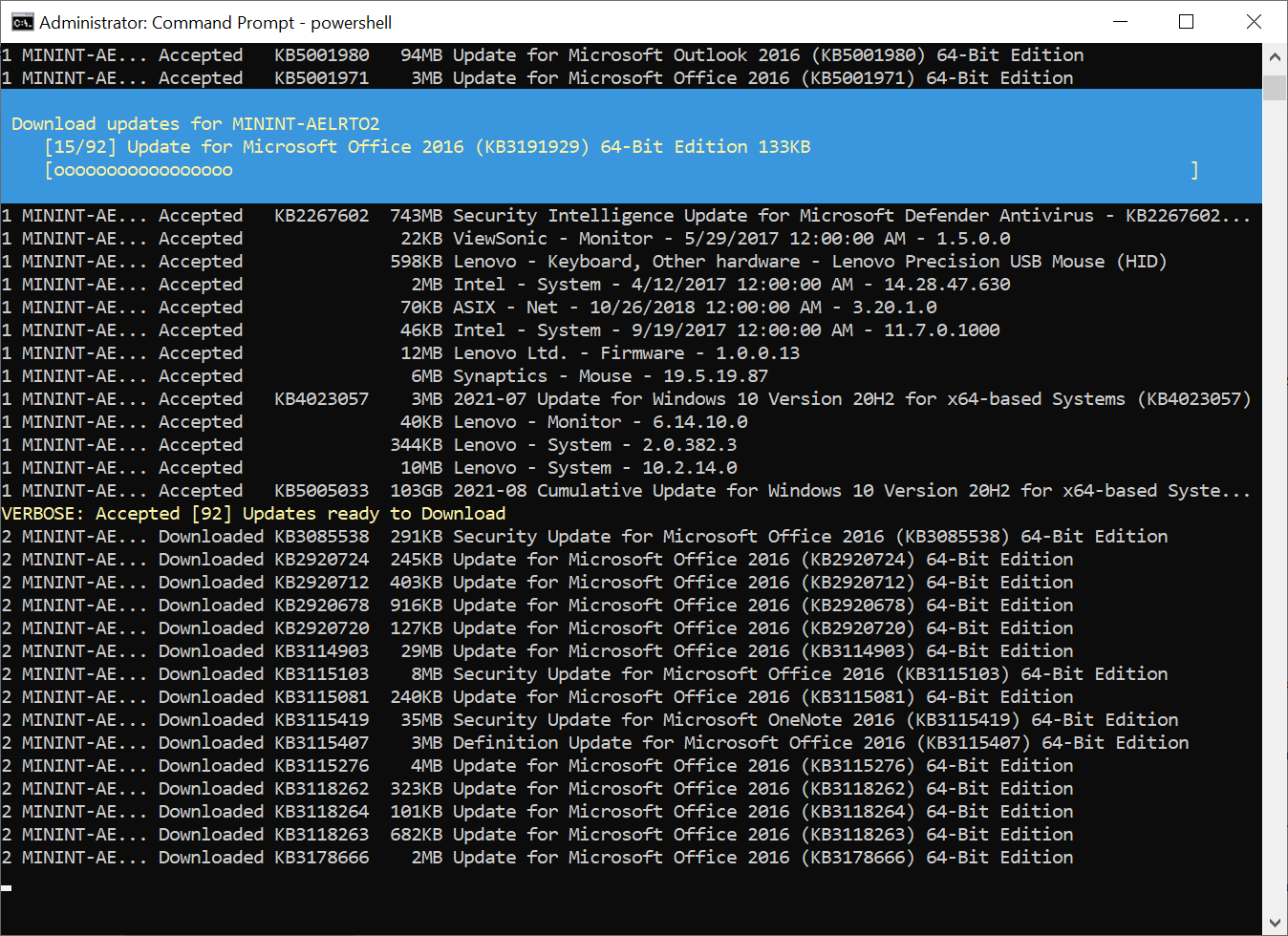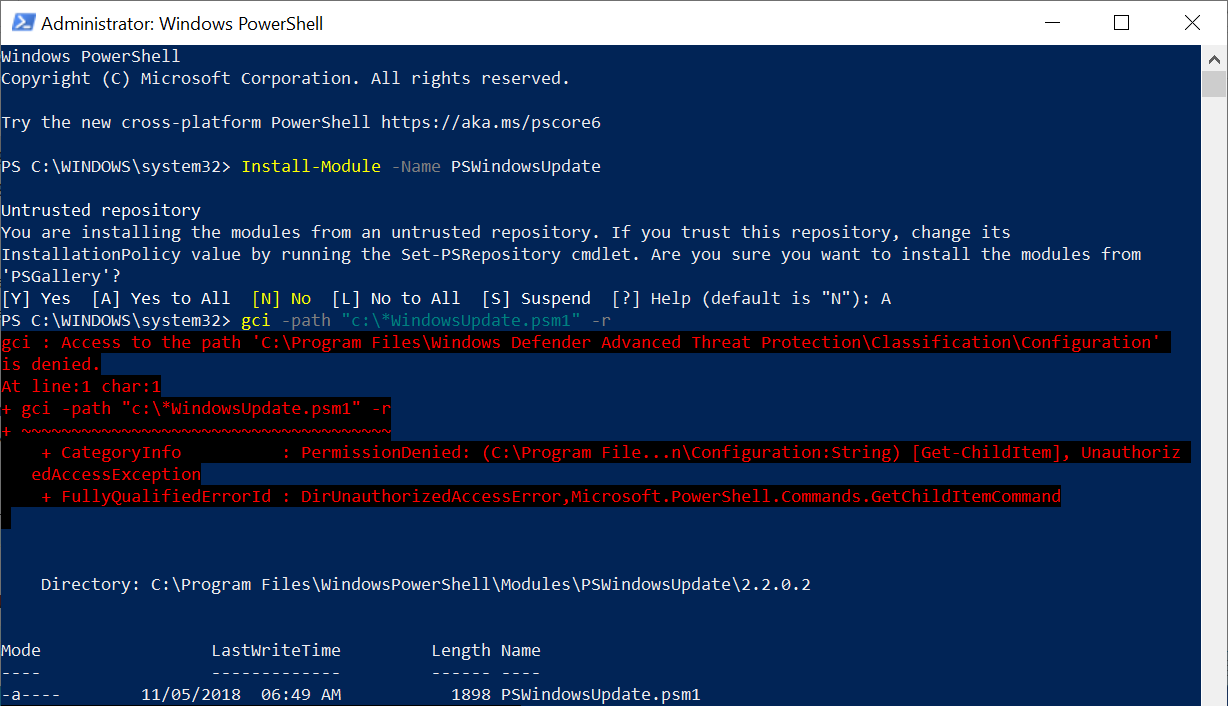Hi All,
I am looking for some help. I just started with a new company, and one of my first tasks is to log into computers to run a ".ps1" script. I know this doesn't sound complicated, but it sure is tedious as the computer log that needs to be completed is well in the hundreds.
Okay, so the problem. This company has a beautiful working ".ps1" that is distributed the domain group policy. However, running the script requires logging into the computer as an administrator because remote "running the script" does not work.
Errors Received.
When Attempting to use:invoke-command
Invoke-Command -FilePath C:\AdminTools\PowerShell\RemovedCompanyData.ps1 -ComputerName RemovedCompanyData -Credential $c
RemovedCompanyData
ListOnly is False
NoDrivers is False
KB not to install is False
RemovedCompanyData: Access denied. You don't have permission to perform this task.
- CategoryInfo : PermissionDenied: (:) [Get-WURebootStatus], Exception
- FullyQualifiedErrorId : PSWindowsUpdate.GetWURebootStatus
- PSComputerName : RemovedCompanyData
Press any key to continue ...
Exception calling "ReadKey" with "1" argument(s): "The method or operation is not implemented."
- CategoryInfo : NotSpecified: (:) [], MethodInvocationException
- FullyQualifiedErrorId : RemoteException
- PSComputerName : RemovedCompanyData
So, i Deleted the section "#region Checks reboot status and install or list updates" from the ".ps1".
Okay, It runs. But without completing the purpose of the ".ps1".
If the ".ps1" is run as an administrator logged into the computer, the correct log will show the following:
RemovedCompanyData
ComputerNameRemoved$
ListOnly is False
NoDrivers isFalse
No KB equals False
X ComputerName Result KB Size Title
However, running ".ps1" using invoke-command with the removal of the "#region checks reboot.." the log file show's this, which is WRONG.
RemovedCompanyData
End_User_account_name
ListOnly is False
NoDrivers isFalse
No KB equals False
Even though we use the same administrator credentials that are used for logging in as administrators.
Now digging very deep into the problem, i believe there's a problem with "#region Load Embedded Functions" and "windows Updates" do not work with invoke-Command.
Any Ideas, anybody? Please and thank you.
param
(
[string]$NoKB = $false,
[string]$NoDrivers = $false,
[string]$ListOnly = $false,
[string]$email = $false
)
#region Define email, log and other static variables.
$version = "RemovedCompanyData"
$logfile = "C:\RemovedCompanyData" # Log file loacation.
IF ($email -eq $false)
{
$mail = "RemovedCompanyData" #email sent to.
}
Else
{
$mail = "RemovedCompanyData"+";"+"$email" #email sent to.
}
$eSubject = "WUScript completed on " + $ENV:computername + " by " + $env:username # email subject line unless change later in the script.
$fmail = $ENV:computername + "RemovedCompanyData"
#endregion
#region Checks that PSWindowsUpades module exists
$testPathPSWU = Test-Path 'C:\AdminTools\PowerShell\PSWindowsUpdate\PSWindowsUpdate.psm1'
IF ($testPathPSWU -eq $true)
{
Try
{
Import-Module 'C:\AdminTools\PowerShell\PSWindowsUpdate\PSWindowsUpdate' -ErrorVariable Err
}
Catch
{
Write-Host 'Exiting -PSWindowsUpdate failed to load'
Get-Date | Out-File $logFile -Append
$Err | Out-File $logFile -Append
Exit
}
}
Else
{
Write-Host 'Exiting -PSWindowsUpdate not available on' + $ENV:computername
Get-Date | Out-File $logFile -Append
'Exiting -PSWindowsUpdate not available on' + $ENV:computername | Out-File $logFile -Append
Exit
}
$testPathEmail = Test-Path 'C:\AdminTools\PowerShell\PSWindowsUpdate\PSWindowsUpdate.psm1'
IF ($testPathEmail -eq $true)
{
Try
{
Import-Module 'C:\Program Files\WindowsPowerShell\Modules\RemovedCompanyData.psm1' -ErrorVariable Err
$sendmail = $true
}
Catch
{
Write-Host 'Sendmail failed to load'
Get-Date | Out-File $logFile -Append
$Err | Out-File $logFile -Append
$sendmail=$false
}
}
#endregion
#region Check DoNotConnectToWindowsUpdateInternetLocations sets registy key value to 0 if needed.
function Get-RegistryValue {
param(
$key,
$name
)
$key = $key -replace ':',''
$regkey = "Registry::$key"
$regkey
Get-ItemProperty -Path $regkey -Name $name |
Select-Object -ExpandProperty $name
}
$registryPath = "Registry::HKEY_LOCAL_MACHINE\SOFTWARE\Policies\Microsoft\Windows\WindowsUpdate"
$Name = "DoNotConnectToWindowsUpdateInternetLocations"
$value = "0"
IF (!(Test-Path $registryPath))
{
#New-Item -Path $registryPath -Force | Out-Null
#New-ItemProperty -Path $registryPath -Name $name -Value $value -PropertyType DWORD -Force | Out-Null
}
ELSE
{
Set-ItemProperty -Name $name -Path $registryPath -Value $value -Force -verbos
#New-ItemProperty -Path $registryPath -Name $name -Value $value -PropertyType DWORD -Force | Out-Null
}
#endregion
#region Load Embeded Functions
<#
.SYNOPSIS
List available updates.
.DESCRIPTION
Retrieves list of available updates to install
.PARAMETER NoKB
KB #s not to include in list
.EXAMPLE
PS C:\> GetWUList
.NOTES
Additional information about the function.
#>
function GetWUList
{
param
(
[Parameter(Position = 0)]
[string]$NoKB
)
Write-Host 'Getting update list'
if ($NoKB -eq $null)
{
$UL = Get-WUList -WindowsUpdate -MicrosoftUpdate -Verbose
}
Else
{
$UL = Get-WUList -WindowsUpdate -MicrosoftUpdate -NotKBArticleID $NoKB -Verbose
}
$UL
Get-Date | Out-File $logFile -Append
$UL | Select-Object -property KB, Title, Size, Type | Out-File $logFile -Append
$date = Get-Date
$ebody = $ENV:computername + " Windows Updates ListOnly completed at " + $date + " running " + $version
Send-Mail $mail $fmail $eSubject $eBody
}
<#
.SYNOPSIS
Installs windows updateW/ Drivers
.DESCRIPTION
.PARAMETER NoKB
String of KB#s that shouldn't be installed likke 'KB2483139, KB982018, KB3139398'
.EXAMPLE
PS C:\> Install-Updates
.NOTES
Additional information about the function.
#>
function Install-Updates
{
param
(
[Parameter(Mandatory = $false,
Position = 0,
HelpMessage = 'Pass KB #s not to install.')]
[string]$NoKB
)
If ($NoKB -eq $null)
{
Write-Host "Installing updates"
Get-WUinstall -MicrosoftUpdate -AcceptAll -install -IgnoreReboot -OutVariable WULog -Verbose -ErrorAction Continue -ErrorVariable Err
}
Else
{
Write-Host "Installing updates without KB(s) " $NoKB
Get-WUinstall -MicrosoftUpdate -NotKBArticleID $NoKB -install -AcceptAll -IgnoreReboot -OutVariable WULog -Verbose -ErrorAction Continue -ErrorVariable Err
}
$date = Get-Date
$WULog | Out-File $logFile -Append
$Err | Out-File $logFile -Append
#$ebody = $ENV:computername + " Windows Updates install completed at " + $date + " running " + $version
If ($Err)
{
Send-Mail $mail $fmail $eSubject $Err
}
}
<#
.SYNOPSIS
installs windows update without drives
.DESCRIPTION
A detailed description of the Install-UpdatesND function.
.PARAMETER NoKB
Pass KB #s to avoid installing.
.EXAMPLE
PS C:\> Install-UpdatesND -NoKB 'Value1'
.NOTES
Additional information about the function.
#>
function Install-UpdatesND
{
param
(
[Parameter(Mandatory = $false,
Position = 0,
HelpMessage = 'Pass KB #s to avoid installing.')]
[string]$NoKB
)
IF ($NoKB -eq $null)
{
Write-Host "Installing updates NO DRIVERS"
Get-WUinstall -UpdateType 'Software' -MicrosoftUpdate -AcceptAll -Install -IgnoreReboot -OutVariable WULog -Verbose -ErrorAction:Continue -ErrorVariable Err
}
Else
{
Write-Host "Installing updates NO DRIVERS & without KB(s) " $NoKB
Get-WUinstall -UpdateType 'Software' -MicrosoftUpdate -NotKBArticleID $NoKB -AcceptAll -Install -IgnoreReboot -OutVariable WULog -Verbose -ErrorAction:Continue -ErrorVariable Err
}
$date = Get-Date
$WULog | Out-File $logFile -Append
$Err | Out-File $logFile -Append
$ebody = $ENV:computername + " Windows Updates install completed at " + $date + " running " + $version
Send-Mail $mail $fmail $eSubject $eBody
}
#endregion
Get-Date | Out-File $logFile -Append
$version | Out-File $logFile -Append
$env:username | Out-File $logFile -Append
'ListOnly is ' + $ListOnly | Out-File $logFile -Append
'NoDrivers is' + $NoDrivers | Out-File $logFile -Append
'No KB equals ' + $NoKB | Out-File $logFile -Append
CLS
Write-Host $version
Write-Host "ListOnly is" $ListOnly
Write-Host "NoDrivers is" $NoDrivers
Write-Host "KB not to install is" $NoKB
#region Checks reboot status and install or list updates.
$RStatus = Get-WURebootStatus -Silent
If ($RStatus -eq $false)
{
If($ListOnly -eq $false){
If ($NoDrivers -eq $false){
Install-Updates $NoKB
$RStatus = Get-WURebootStatus -Silent
Write-Host Reboot Required $RStatus
}
Else{
Install-UpdatesND $NoKB
$RStatus = Get-WURebootStatus -Silent
Write-Host Reboot Required $RStatus
}
}
Else
{
GetWUList $NoKB
Write-Host "Press any key to continue ..."
$x = $host.UI.RawUI.ReadKey("NoEcho,IncludeKeyDown")
}
}
Else
{
$ComputerName + " needs reboot" | Out-File $logFile -Append
Write-Host "Press any key to continue ..."
$x = $host.UI.RawUI.ReadKey("NoEcho,IncludeKeyDown")
}
#EndRegion


